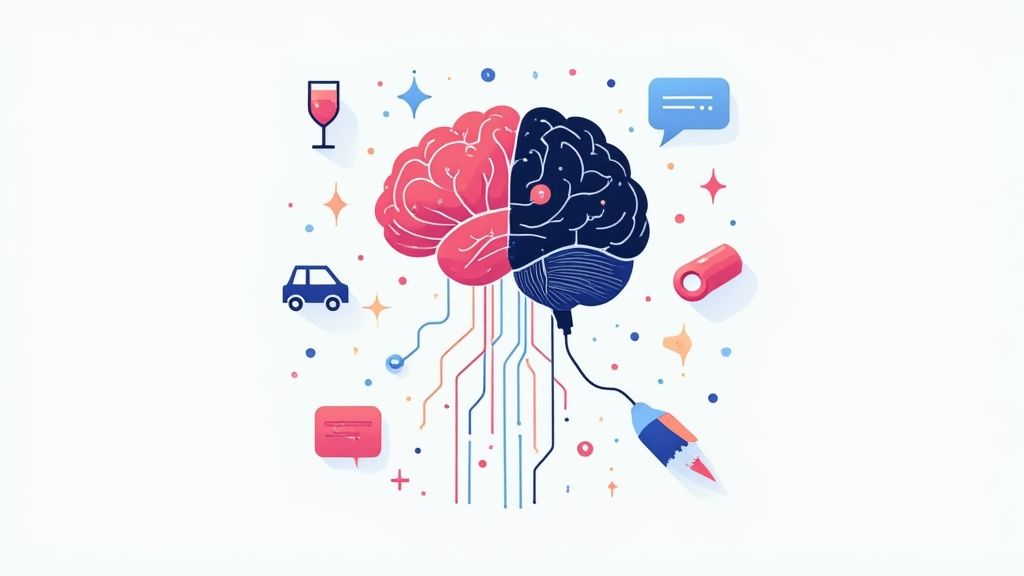Staring at a blank page is stressful. You have a speech to give, but every idea feels too big, too small, or just… wrong. You're not alone. Finding an informative speech topic that grabs your audience and sparks your own curiosity is the hardest part.
A great topic is the foundation for a presentation that connects and educates. It's the difference between a speech people remember and one they forget the second you leave the stage.
This guide will get you unstuck. We’ve packed it with engaging informative speech topic ideas that work in any setting—from a classroom to a boardroom. Let's find the perfect topic to turn your blank page into a powerful presentation.
1. The Science of Sleep: How It Impacts Your Brain and Body
Everyone sleeps, but few people really get it. That makes the science of sleep a perfect informative speech topic. It's packed with fascinating facts and practical advice that can genuinely improve your audience's well-being.
You can go way beyond the simple "get 8 hours" advice. Dive into the different sleep stages, like REM, and explain their roles in memory and recovery. Talking about circadian rhythms helps your audience see why when you sleep is just as important as how long.
How to Structure Your Speech
- Hook: Start with a surprising stat about sleep deprivation. Ask your audience: "How well do you really think you sleep?"
- The Core Science: Explain sleep cycles with a simple visual. Show how your brain moves through different stages during the night.
- Real-World Impact: Use powerful examples. Talk about how just one night of bad sleep tanks your cognitive function.
- Actionable Tips: End with 3-5 simple tips for better sleep hygiene, like avoiding blue light before bed. You'll give your audience a tool they can use that very night.
2. Artificial Intelligence: How It's Changing Your World Right Now
AI isn't science fiction anymore. It's in your phone, your car, and your Netflix queue. That makes it a killer informative speech topic because it's relevant, exciting, and a little controversial.
Your speech can demystify AI. Show your audience how it already shapes their daily lives and what's coming next.

A great speech on AI makes abstract ideas feel real. A key part is understanding what AI-generated content is and how tools like ChatGPT work. This helps your audience get the core mechanics without getting lost in jargon.
How to Structure Your Speech
- Hook: Ask your audience how many times they've already used AI today. Reveal surprising examples, like spam filters or movie recommendations.
- The Core Tech: Explain concepts like machine learning in simple terms. Use analogies to make it click for everyone.
- Real-World Impact: Show, don't just tell. Discuss how AI is helping doctors detect cancer earlier or how it powers self-driving cars.
- The Big Picture: End by talking about the future. Cover both the incredible potential and the tough ethical questions. And if you've inspired your audience, tools like GenPPT can help them use AI for creating a compelling PowerPoint presentation.
3. Renewable Energy: From Ancient Windmills to Our Future
Energy powers your world, but where it comes from is changing fast. "The History of Renewable Energy" is a timely and compelling informative speech topic. It's a story of human ingenuity and our shared effort to build a sustainable future.
You can frame renewable energy not as a new idea, but as the original one. Trace its roots from ancient water wheels to modern solar farms. You'll show your audience how technology is making green energy a real competitor to fossil fuels.
How to Structure Your Speech
- Hook: Show a powerful image of a massive wind turbine. Ask your audience to guess when humans first harnessed wind power.
- The Historical Arc: Walk them through the timeline. Start with early dams and solar cells, then move to the breakthroughs of the 21st century.
- Today's Landscape: Use clear charts to show the growth of solar, wind, and hydropower. Compare their costs to fossil fuels using credible data.
- Actionable Takeaways: Bring the global issue home. Talk about local renewable projects or simple ways your audience can support the transition.
4. Mental Health: Understanding Anxiety and Depression
Talking about mental health is more important than ever. This makes it a powerful and impactful informative speech topic. You have a chance to fight stigma and educate your audience on the science behind common psychological disorders.
Your speech can provide real clarity and hope.

A great speech on mental health is balanced. It combines clinical facts with human empathy. Your goal is to make the topic approachable, reducing the fear that often surrounds it and showing people where to find support.
How to Structure Your Speech
- Hook: Start with a compelling stat from an organization like the National Institute of Mental Health (NIMH) about how common these conditions are.
- Defining the Terms: Clearly explain 2-3 specific disorders in simple language. Describe the symptoms and how they differ from everyday sadness or stress.
- Destigmatize and Inspire: Share stories of public figures who have spoken openly about their struggles. This reframes getting help as a sign of strength, not weakness.
- Actionable Resources: End with a clear list of where to get help. Provide national hotline numbers and websites like Mental Health America. Let your audience know recovery is possible.
5. Social Media: Its Impact on You and Society
Almost everyone in your audience uses it, but many don't see its full effect. That's why the impact of social media is such a relevant informative speech topic. It connects directly to your audience's daily habits, mental health, and how we all communicate.
You can go beyond a simple "phones are bad" message. Explore the complex, two-sided nature of our hyper-connected world. Your goal is to help your audience become more mindful digital citizens.
How to Structure Your Speech
- Hook: Start with a relatable anecdote about feeling "phantom vibrations" from your phone. Ask your audience: "Do you control your social media, or does it control you?"
- The Two Sides: Present both the good and the bad. Talk about how Instagram can harm body image, but also how it's used for social justice movements.
- Real-World Impact: Make it concrete. Discuss findings from documentaries like "The Social Dilemma" on how algorithms are designed to keep you scrolling.
- Actionable Tips: End with practical strategies for digital wellness. Offer 3-5 clear tips, like setting app time limits or curating a more positive feed. Learning how to make presentations more engaging can help your message land even better.
6. Nutrition Science: How Food Fuels Your Brain and Body
Everyone eats. But the link between what's on your plate and how you perform is often missed. Choosing "Nutrition Science" as your informative speech topic taps into a universal interest with a personal payoff.
This topic moves beyond fad diets. It explores the real biochemical impact of food on everything from your focus to your physical energy.
How to Structure Your Speech
- Hook: Tell a relatable story about the "afternoon slump." Ask your audience if they've ever thought about how their lunch affects their focus.
- The Core Science: Explain macronutrients (protein, carbs, fat) in simple terms. Use clear visuals to show nutrient-dense foods versus empty calories.
- Real-World Impact: Make the science concrete. Talk about the "Blue Zones"—places where people live longer, healthier lives—and what they eat.
- Actionable Tips: End with 3-5 practical, science-backed tips. Suggest simple food swaps or a template for a balanced meal. You'll give your audience a tool for a healthier life.
7. Cybersecurity Basics: How to Protect Yourself Online
Our lives are online, making cybersecurity essential knowledge for everyone. This makes "Cybersecurity Basics" a highly practical informative speech topic. You can demystify a complex subject and give your audience skills to protect themselves right away.
Your speech should skip the technical jargon. Focus on simple, everyday habits. Explain the psychology behind phishing scams so they're easier to spot, or show the difference between a weak and a strong password.
How to Structure Your Speech
- Hook: Start with a startling stat about identity theft. Ask your audience how confident they feel about the security of their personal info online.
- The Core Threats: Explain common threats like phishing and malware in simple terms. Use an analogy, like describing a phishing email as a wolf in sheep's clothing.
- Real-World Impact: Use high-profile data breaches as examples. Show that cybersecurity isn't just a tech issue—it's a personal finance and privacy issue.
- Actionable Tips: End with 3-5 crucial, easy-to-implement security tips. Suggest using a password manager and enabling two-factor authentication (2FA).
8. Climate Change: The Science and the Solutions
Few topics are as critical as climate change. A speech on this subject turns you into an educator on one of the most important issues of our time. You can ground a complex conversation in hard data and tangible solutions, giving your audience clarity and a sense of hope.
You can go beyond the headlines. Show the "how" and "why" behind the evidence. Explore the greenhouse effect, showcase data from NASA, and connect it to real-world events like extreme weather.

How to Structure Your Speech
- Hook: Start with a powerful "then and now" image of melting glaciers. Connect it to a recent extreme weather event your audience might have experienced.
- The Core Science: Explain the scientific consensus in simple terms. Use a clear chart like the Keeling Curve, which shows rising CO2 levels.
- Real-World Impact: Make the data tangible. Show images of coral bleaching or discuss the economic effects on farming.
- Actionable Takeaways: End on an empowering note. Focus on global solutions and inspiring local initiatives. Give your audience 3-5 concrete actions they can take.
9. Space Exploration: How It Changed Life on Earth
The story of space exploration is a gripping tale of human ambition and scientific wonder. It makes for an exceptional informative speech topic that captures the imagination. You can also reveal how space-age tech has shaped our modern world in ways your audience never expected.
A great speech on this topic connects celestial discovery to everyday life. You can show how technologies developed for space are now in our phones, hospitals, and homes.
How to Structure Your Speech
- Hook: Start with a stunning image from the Hubble Telescope. Ask your audience how many technologies they use daily—like GPS—that came from the space program.
- A Timeline of Triumph: Create a visual timeline of key milestones, from the first satellites and moon landings to the new James Webb Telescope.
- The Impact on Earth: This is where you make it relevant. Showcase real spinoffs, like how medical imaging was advanced by NASA or how water purifiers for the ISS are now used in disaster relief.
- The Future Frontier: End by looking ahead. Talk about upcoming missions to Mars and the rise of commercial spaceflight. Leave your audience inspired about humanity's future.
10. The Evolution of Communication: From Smoke Signals to Smartphones
The story of communication is the story of humanity. This makes it a fascinating informative speech topic that connects history, sociology, and technology. You'll give your audience a new way to see their own daily interactions with media.
Your speech can go beyond a simple timeline of inventions. Explore the huge societal shifts each new technology caused. Talk about how the printing press fueled revolutions or how TV created a shared national culture.
How to Structure Your Speech
- Hook: Ask your audience to imagine a world before instant messaging. Highlight how a single invention, like the telegraph, changed everything.
- A Journey Through Time: Structure your speech chronologically. Cover the printing press, the telegraph, radio, TV, and the internet.
- Societal Impact: For each technology, focus on the "so what?" Explain how it reshaped society, from family life to politics.
- The Next Chapter: End by connecting history to today. Discuss how social media and AI are continuing the story. Ask your audience: what's next?
Comparison of 10 Informative Speech Topics
| Topic | Implementation complexity 🔄 | Resource requirements ⚡ | Expected outcomes 📊 | Ideal use cases 💡 | Key advantages ⭐ |
|---|---|---|---|---|---|
| The Science Behind Sleep and Its Impact on Health | Moderate — scientific concepts that need simplification 🔄 | Low — slides, sleep graphs, research citations ⚡ | Increased awareness and practical sleep improvements 📊 | Wellness talks, schools, workplace health sessions 💡 | Highly relatable; actionable recommendations; strong evidence ⭐ |
| Artificial Intelligence: Current Applications and Future Implications | High — technical depth and fast evolution; needs careful simplification 🔄 | High — demos, up‑to‑date examples, multimedia, expert sources ⚡ | Broader understanding of opportunities/risks; informed debate 📊 | Tech conferences, industry briefings, policy panels 💡 | Timely, wide appeal; sparks innovation and ethical discussion ⭐ |
| The History and Evolution of Renewable Energy Sources | Moderate‑high — mixes technical, historical and policy elements 🔄 | High — data, charts, case studies, local project examples ⚡ | Policy and investment awareness; motivation for adoption 📊 | Environmental forums, community planning, policy events 💡 | Global relevance; inspiring success stories; solution‑oriented ⭐ |
| Mental Health Awareness and Common Psychological Disorders | Moderate — sensitive content requiring careful framing 🔄 | Moderate — authoritative sources, resources, trigger management ⚡ | Destigmatization and increased help‑seeking; support linkage 📊 | Schools, workplaces, public health campaigns 💡 | High resonance; potentially life‑changing; empowers audiences ⭐ |
| The Impact of Social Media on Society and Youth Development | Moderate — behavioral + technical dynamics; rapidly changing 🔄 | Low‑moderate — current studies, examples, media clips ⚡ | Improved digital literacy; balanced view of benefits/harms 📊 | Youth education, parent workshops, media literacy sessions 💡 | Immediately relevant; relatable case studies; prompts discussion ⭐ |
| Nutrition Science: How Diet Affects Physical and Cognitive Performance | Moderate — evolving evidence; requires careful nuance 🔄 | Moderate — dietary visuals, peer‑reviewed studies, meal examples ⚡ | Practical dietary changes and myth correction; health outcomes 📊 | Health seminars, sports teams, community workshops 💡 | Universal relevance; actionable guidance; evidence‑based ⭐ |
| Cybersecurity Basics: Protecting Yourself in the Digital Age | Moderate‑high — technical topics but highly actionable 🔄 | Low‑moderate — demos, step‑by‑step guides, handouts ⚡ | Immediate improvement in personal security practices 📊 | Workplace training, family safety workshops, community events 💡 | Highly actionable; empowers individuals; prevents harm ⭐ |
| Climate Change: Scientific Evidence and Global Solutions | High — complex systems and politicization; needs clarity 🔄 | High — scientific data, visuals, solution case studies ⚡ | Increased awareness, policy engagement, mitigation action 📊 | Policy forums, educational programs, public campaigns 💡 | Critical global relevance; abundant data to support action ⭐ |
| The History and Impact of Space Exploration | Moderate — blend of history and technology; visually driven 🔄 | Moderate — images, videos, timelines, anecdotes ⚡ | Inspiration, STEM interest, awareness of tech spinoffs 📊 | Public lectures, schools, science festivals 💡 | Universally inspiring; cross‑generational appeal; rich stories ⭐ |
| The Evolution of Communication Technology and Its Societal Effects | Moderate — broad scope; requires synthesis of trends 🔄 | Low‑moderate — historical media, timelines, comparative examples ⚡ | Contextual understanding of societal change and future trends 📊 | Media studies, history talks, technology seminars 💡 | Demonstrates patterns across eras; connects past to future ⭐ |
Turn Your Topic Into a Deck That Wins
You’ve found your launchpad. The perfect informative speech topic is one that sparks your curiosity and offers real value to your audience.
Remember to choose a topic that connects with your audience's needs. A broad subject like "social media" is forgettable. A focused one like "How Instagram's Algorithm Shapes Gen Z's Spending Habits" is sharp, intriguing, and much easier to deliver.
Your speech isn't just a data dump. It’s a story. Once your content is ready, your delivery is what makes it land. A great idea deserves a confident voice. For practical strategies, it's helpful to learn how to build confidence in public speaking.
Ready to turn your powerful informative speech topic into a presentation that wins? Stop wrestling with templates and let GenPPT build your deck in minutes. Just provide your outline or notes, and our AI will create clean, professional slides, so you can focus on delivering your message with impact. Get started with GenPPT today and present with confidence.
